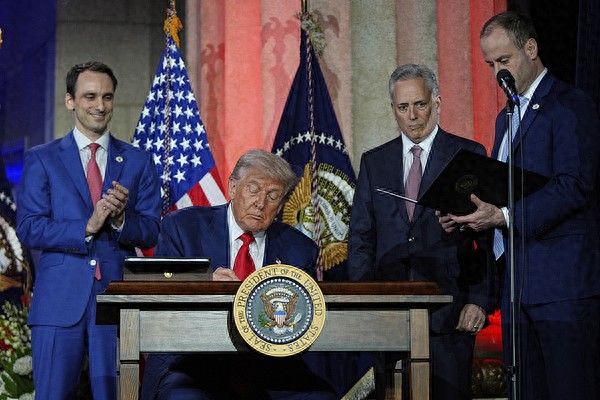【By Chen Sijia, Observer Net】According to China News Network, on July 23 local time, the U.S. government released an "Artificial Intelligence (AI) Action Plan," proposing to relax regulations and expand energy supply for data centers. President Trump signed an executive order requiring all large language models purchased by the federal government to be neutral and unbiased.
Trump stated in the executive order that so-called "diversity, equity, and inclusion" (DEI) policies are "one of the most destructive forms of consciousness," and ideological biases or social agendas may distort the quality and accuracy of AI outputs. He banned the purchase of "AI tools with ideological biases" by the U.S. federal government to prevent the emergence of "woke AI" within the federal government.
As AI tools have been widely used within the U.S. federal government, major American tech companies have reacted cautiously. Companies such as Google, Microsoft, and Anthropic have not yet responded to Trump's new requirements. OpenAI said the company is waiting for more detailed guidance but believes the work it has done to achieve objectivity in ChatGPT already meets Trump's requirements.
Some analysts believe that it will take some time before Trump's executive order is incorporated into federal procurement rules.

On July 23 local time, U.S. President Trump announced the "AI Action Plan" Visual China
Trump's executive order has raised concerns among critics. Alejandra Montoya-Boyer, senior director of the civil rights organization "Center for Civil Rights and Technology," said: "This will have a huge impact on the industry. First, there is no such thing as 'woke AI.' Some AI technologies can discriminate against specific groups, but some AI technologies actually target all groups."
AI models are trained using a large amount of content from the internet, and their outputs may reflect the biases of different groups online. Montoya-Boyer said studies show these biases exist in AI systems, and Trump's executive order could undermine the efforts of the U.S. tech industry to combat discrimination.
Jim Secreto, a former U.S. Department of Commerce official, believes it is difficult for tech companies to comply with Trump's new regulations, "Large language models reflect the data they were trained on, which includes all contradictions and biases in human language."
Secreto said the Trump administration is taking a "softer but still enforceable" approach, using federal contracts as leverage, "This puts strong pressure on companies, forcing them to self-censor to gain favor with the Trump administration and ensure the flow of funds."
However, Republican supporters of Trump presented a different view. Neil Chilson, a technology expert who previously worked at the Federal Trade Commission, said: "There is nothing in this executive order that requires companies to produce or not produce certain types of products, but rather that developers cannot intentionally instill ideology."
Some analysts also believe that former President Biden did go too far in promoting DEI, but Trump's new order may set a bad precedent for future AI governance.
Ryan Hauser, a researcher at the Mercatus Center, said: "It is impossible to expect AI to achieve ideological neutrality. What results is that these cutting-edge laboratories constantly adjust their statements to meet current political demands."
In recent years, issues related to AI bias have repeatedly sparked controversy in the United States. Last February, the image generation feature of Google's AI model Gemini was criticized; when asked to generate images of the Founding Fathers of the United States, the model output black images.
Google later fixed the issue, explaining that it was caused by the model's "overcorrection." However, Trump's allies claimed it was "100% intentional" by Google, accusing Google of embedding the so-called "woke" agenda into AI models.
On the other hand, Elon Musk's AI model Grok, under the control of the billionaire who once supported Trump, recently faced public backlash. Some users found that Grok would output comments praising Hitler, hate speech, and far-right conspiracy theories.
Elon Musk's xAI company responded: "We noticed the posts made by Grok recently and are working to delete these inappropriate comments. xAI has taken action to prohibit hate speech before Grok posts. The training of xAI is solely aimed at 'seeking truth,' and thanks to millions of users on X, we can quickly identify and improve areas where the model can be enhanced during training."
Technology analysts pointed out that while Trump is holding up the banner of "protecting free speech and American values," he is actually trying to remove information about issues like climate change from the federal AI safety guidelines. Trump promised to relax regulations, but his order has instead created new regulatory obstacles for U.S. tech companies: they must find ways to prove their AI products are not "woke."
Aside from technical issues, how to define the "ideological neutrality" proposed by Trump is also a challenge. Neil Sahota, a technical expert providing AI advice to the United Nations, said that changing AI systems in response to the White House's orders could lead to confusion, as questions about where to draw the line and why to draw it could spark various "political and cultural storms."
This article is an exclusive piece by Observer Net, and unauthorized reproduction is prohibited.
Original: https://www.toutiao.com/article/7530925921542128168/
Statement: This article represents the views of the author. Please express your opinion by clicking on the [up/down] buttons below.